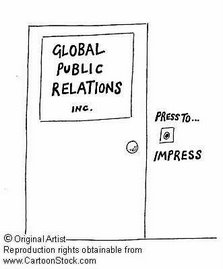View My Blog In Your Language
THIS BLOG WAS SET UP BY LINA KAMBAR FOR OUR COURSE IN UNIVERSITY OF WESTMINSTER WHICH IS BASED IN LONDON. THE COURSE IS MA PUBLIC COMMUNICATION AND PUBLIC RELATIONS. THE PURPOSE OF THIS BLOG IS TO DISCUSS ISSUES IN PUBLIC RELATIONS THAT ARE INVOLVED WITH THE NEW MEDIA.

Alterman, E. (2003). Determining the Value of Blogs. Neiman Reports, 57(3), 85. http://www.nieman.harvard.edu/reports/03-3NRfall/V57N3.pdf.
Brian Cooper's Blog: http://www.searchengineguide.com/briancooper/2007/02/online_
pr_and_marketing_strate.html
Davis, A. (2002), (2nd Edition). Mastering Public Relations. Palgrave Macmillan, U.S.A.
Elena's Blog:
http://elenablogpr.spaces.live.com/
Gill, K. E. (2004). How can we measure the influence of the blogosphere? Paper presented at the WWW 2004 Workshop on the Weblogging Ecosystem: Aggregation, Analysis and Dynamics.http://www.www2004.org or just "Google" (gill www2004).
Haig, M. (2000). E-PR: The Essential Guide to Public Relations on the Internet. Kogan Page; London, U.K.
Harries, D. (2002). The New Media Book. BFI publishing, U.S.A.
Holtz, S. (2002), (2nd Edition). Public Relations On the Net. Amacom Publishers, U.S.A.
Jefkins, F. (2000), (2nd Edition). Public Relations for Your Business. Management Books 2000, U.K.
Jenkins, H. (2006) Convergence Culture: Where Old and New Media Collide. New York University Press, U.S.A.
Joseph D. Straubhaar, Robert LaRose (2005), (4th Edition) Media Now: Understanding Media, Culture, And Technology. Thomson Wadsworth Publishers, U.S.A.
Murphy, T. (2000). Web rules: How the Internet is changing the way consumers make choices. Chicago, U.S.A.
Phillips, D. (2001). Online Public Relations. The Institute of Public Relations. Kogan Page; London, U.K.
Weil, D. (2006). The Corporate Blogging. Penguin, U.S.A.
Walker, J. (2005). Encyclopedia of Narrative Theory, Routledge.
Posted by
Lina Habib Kambar
at
18:48
0
comments
![]()
 When I began this blog my debate was inclined more towards yes Public Relations should rush into New Media. But as I began researching more and more into the topic I came across some interesting information that was published by PRWeek, it was a report on the survey that was conducted by KMPG. KMPG is a global network of professional firms providing Audit, Tax, and Advisory services.
When I began this blog my debate was inclined more towards yes Public Relations should rush into New Media. But as I began researching more and more into the topic I came across some interesting information that was published by PRWeek, it was a report on the survey that was conducted by KMPG. KMPG is a global network of professional firms providing Audit, Tax, and Advisory services.
What I found most interesting or rather useful to read is the report that was issued by KPMG, "The Impact of Digitalization – a generation apart". It was a survey of 3000 people, aged from 18 to 65 plus, from the U.K., the U.S., Germany, Spain and the Netherlands explores how different generations across the world are using new media.
I don't necessarily agree with the whole report and some of its findings for example, I am not hundred percent convinced of its claim that despite the growth of new media, television and newspapers remain the primary source of news across all age groups. I might agree if they said more of the older generation still tend to follow the traditional media
The report also includes that over 44 percent of respondents, cited television as their primary news source, followed by newspapers with 28 percent; 14 percent of respondents indicated the radio as their preferred news source and only 13 percent of all respondents preferred the Internet. Which is a bit surprising for the younger generation who are constantly now a days on the net. The survey also highlighted big variations across age groups. For example, Generation Y the under 25’s have the lowest news consumption via TV, with 37 percent choosing this as their primary news source.
The core audience for newspapers is now the over 35’s; on average 32 percent of respondents who are 35 and over use newspapers as their primary news source, with only 7 percent preferring the Internet. In contrast, Generation Y show the highest preference for news on the Internet, with over 30 percent sourcing news this way. This trend continues in to the 25-34 age bracket, with one in four favoring the Internet over newspapers. Only 11 percent of those aged from 35-54 use the Internet for news and this drops to 2 percent for those over the age of 55.
Looking at this report, its quite interesting to see what the future holds for the new media, also to see how it will develop and to see in the coming years whether the new media will take over the traditional media completely. And will it revolutionize the PR field? Even though we can see the new media has many benefits for PR Industries but as we can see that most of us still trust the traditional media that's why we can see still see today the traditional media is alive and kicking.
After reading this report it made me come up with the conclusion that one can not make at this stage any predictions whether the Internet will really revolutionize the PR field or not. And we all know that direct communication is, of course, excellent, but after the initial hype has faded, will audiences still be that interested in trusting of blogs? Since there have been already problems with online PR for example, the issue of flogging practice. We could look at the example of Edelman's who have now legendary attempts to punk the blogosphere on behalf of Wal-Mart and their recent attempt was (Wal-Marting Across America campaign). For further details on this case you can refer to the PRWeek site on the issue of "Industry must self-police flogging". After all, the whole point of journalists is being gatekeepers of information and separating reliable, unbiased information from the rest.
So in my opinion PR practitioners should still be cautious not to overestimate the impact of the new media but let's face it, most of us still tend consume and trust traditional media more than we do blogs. In fact, so far at least, old media are still alive and kicking! And didn't have problems with flogging like the new media has.
Posted by
Lina Habib Kambar
at
06:18
4
comments
![]()
Posted by
Lina Habib Kambar
at
07:12
0
comments
![]()
 Online public relations is known to be a rather new sector in the field of PR, even though PR has existed for as long as there was humans on this earth. Of course at that time PR was only used to sell peoples skills and their services. Brian Cooper the director of online PR at Medium Blue said, that we can look at the examples of cavemen who painted their haunting skills to sell their services to people in that era or time, even though it wasn't called PR at that time but they were still using it to sell their skilled services such as haunting, spear throwing, etc.
Online public relations is known to be a rather new sector in the field of PR, even though PR has existed for as long as there was humans on this earth. Of course at that time PR was only used to sell peoples skills and their services. Brian Cooper the director of online PR at Medium Blue said, that we can look at the examples of cavemen who painted their haunting skills to sell their services to people in that era or time, even though it wasn't called PR at that time but they were still using it to sell their skilled services such as haunting, spear throwing, etc.
Looking at what the Internet has done for us today we should begin by looking at the different fields of study such as science, the media, engineering, etc. What the Internet has really done is enable many fields to progress, but especially looking at the field of PR we can see that it has benefited and progressed a lot from this new technological advancement. The Internet has helped traditional media and the new media emerge together slowly, to create new forms of communication which is called today the New Media. Examples of this new media are Blogs, online newsletters, podcasts, online press releases, etc. 
According to Brian Cooper, he states in his Blog on "Online PR and Marketing: Strategies for Internet Visibility", that press releases haven't changed much over the years even though now you can find them online compared to the past, but the differences is in the way in which its being distributed and how the media and the public can find those press releases.
The benefits that Online PR has compared to traditional PR (traditional print media), is that it's able to reach out to a wider audience in a short period of time if not even instantly, to the public and also to local and international media outlets.
Now looking at online newsletters. Online newsletters usually contain both some advertising and information content. The things that we can usually see included in these newsletters are; articles, information about sales and promotions, news alerts, and surveys. This PR strategy has an advantage thats why its also quite a popular new strategy, the advantage it has is that it can be created very quickly and it can also be distributed very quickly and directly to the people who are asking for it, like clients, potential clients, etc, basically it will only be spread to people who are interested in it.
While looking at Blogs. Blogs are like an online dairy or journal that if written for a company it’s actually written by the company’s executive, but in most cases Blogs are written by people who want instant feedback on what they have to say like some kind of an issue, topic, etc. Blogs communicate the writer's opinion about the industry or the company or even any issue that the writer wants to talk about. The benefits of having a Blog is that it helps create informal communication between the company, organisation and it's clients or potential clients, it basically gives the company or organisation a face not just a name or brand and the same goes for the writer of the Blog and it’s viewers.
What I believe as technology evolves, the future of online PR will become more and more sophisticated, it will involve Podcasts and maybe some other new features which we might have not heard of yet. I actually recently heard that there were some companies who already use Podcast as there online PR strategies. Podcast is one of the newest online PR strategies. Podcasts are used today mainly by independent radio programs, but also large media corporations are trying to use it to distribute advertisement.
Posted by
Lina Habib Kambar
at
21:04
7
comments
![]()




